13 razlogov, zakaj se klimatska naprava ne vklopi in kako jih odpraviti
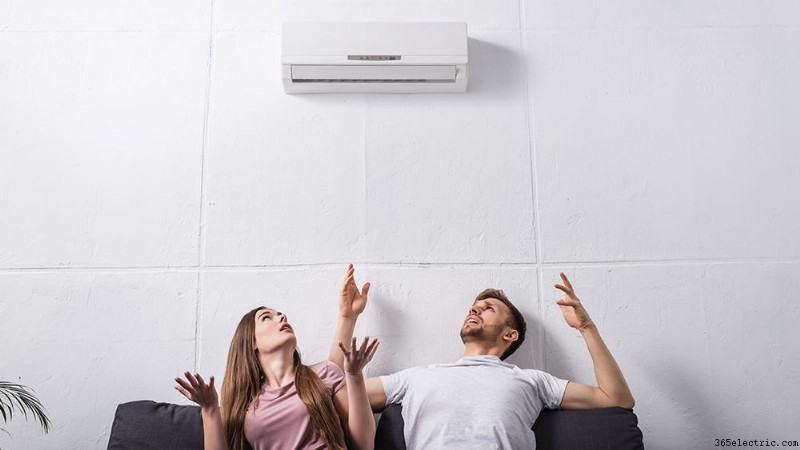
Pričakujete, da bo vaša klimatska naprava delovala brezhibno vsakič, ko jo vklopite; navsezadnje je vaš spremljevalec udobja v vsakem letnem času.
Toda včasih vas lahko vaša HVAC enota zapusti in se noče vklopiti. Če se soočate s podobno situacijo, potem ne skrbite! Morda gre za nekaj, kar je mogoče enostavno popraviti kot rešitev DIY ali v nekaterih primerih s telefonskim klicem strokovnjaka.
Vzroki so lahko različni, od težav z vzdrževanjem do staranja enote; sestavili smo obsežen seznam, ki vam bo pomagal ugotoviti, zakaj se vaša klimatska naprava ne vklopi in kako odpraviti vzrok.
https://www.youtube.com/watch?v=6txPShN10pc1. Okvara termostata
Vaša klimatska naprava je kar naenkrat prenehala delovati. Zgrabite se panike in začnete klicati različne strokovnjake za klimatske naprave.
Toda ustavite se za trenutek. Ste preverili svoj termostat?
Okvara termostata lahko vpliva na delovanje vaše klimatske naprave.
Najprej preverite, ali zaslon vašega termostata sveti. Če je izklopljen, ne more signalizirati vklopa AC. Drugič, preverite baterije termostata, če imate termostat na baterije.
Če so baterije v redu, preverite delovanje termostata. Nastavite ga na hladno nastavitev, ki naj bo 5-6 stopinj nižja od temperature v prostoru. Po nekaj minutah položite roke pred loputo AC, da občutite hladen zrak. Če se je vklopil, potem ste rešili težavo!
Če pa se vaša klimatska naprava še vedno ni vklopila, izklopite termostat in snemite pokrov, da preverite njegove komponente. Poiščite ostanke ali korozijo. Poiščite tudi pregorele varovalke; včasih so krivci. Umazanijo lahko očistite sami z mehko krtačo, vendar se morate za težave s korozijo obrniti na strokovnjaka.
Poleg tega preverite, ali so v termostatu kakršni koli ohlapni vijaki ali žice. Za pravilne sheme ožičenja si morate ogledati uporabniški priročnik.
2. Nizka količina hladilnega sredstva
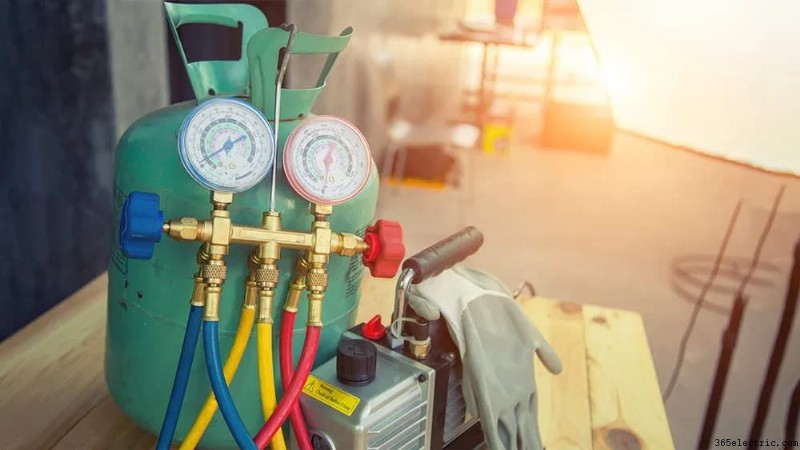
Eden od razlogov, da se klimatska naprava ne vklopi, je lahko pomanjkanje hladilnega sredstva.
Hladilno sredstvo je hladilna tekočina, ki se nahaja v tuljavah AC. V glavnem je odgovoren za zagotavljanje zelo želenega hladnega zraka iz klimatske naprave ali vročega zraka v primeru toplotne črpalke.
Pomanjkanje hladilnega sredstva ni posledica porabe tekočine v vaši klimatski napravi. Puščanje je verjetno krivec v tej situaciji. Razpoke se lahko sčasoma pojavijo v AC tuljavi, kar povzroči puščanje. Nadalje, če si ne vzamete časa za redno vzdrževanje, lahko dolgoročno povzroči korozijo.
Sami v tej situaciji ne morete narediti veliko, saj ne gre samo za polnjenje hladiva; nivoji se morajo natančno ujemati z nivoji, ki jih je določil proizvajalec vaše klimatske naprave. Morali bi se obrniti na strokovnjaka, da preveri ravni hladilnega sredstva in ugotovi razlog za puščanje.
Tej težavi se lahko v prihodnje izognete tako, da poskrbite za redno vzdrževanje vaše klimatske naprave.
3. Zamašeni zračni filtri
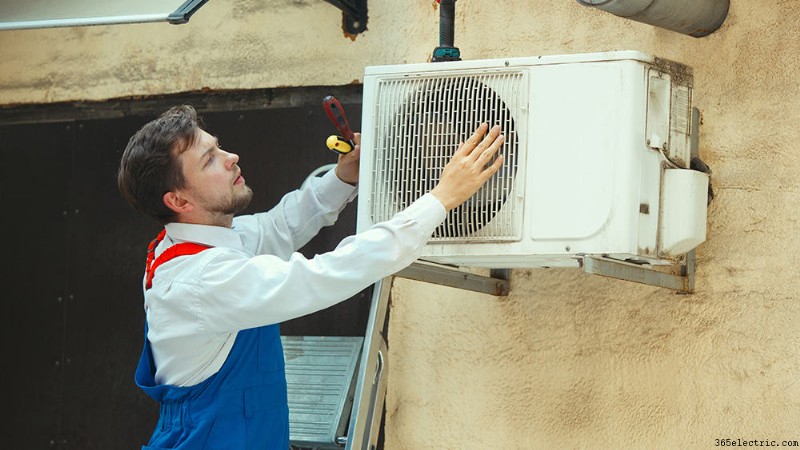
Se spomnite, kdaj ste nazadnje očistili zračne filtre svoje klimatske naprave?
Če je vaš odgovor ne, potem je to velika težava, saj vaša klimatska naprava morda ne bo mogla pravilno delovati zaradi umazanih, zamašenih filtrov. Ne glede na to, katero vrsto klimatske naprave imate, je čiščenje filtrov nujno!
Naloga filtrov je zagotoviti pravilno kroženje zraka. Če so napolnjeni z odpadki, je pretok zraka precej blokiran. V tem primeru se mora vaš sistem bolj potruditi, da ohladi vaš dom, in čez nekaj časa lahko preneha delovati.
Umazani zračni filtri lahko tudi zamrznejo vašo zunanjo klimatsko enoto, kar ovira delovanje vašega sistema in je v nekaterih primerih razlog, zakaj se vaša klimatska naprava ne vklopi.
Čudno, vendar se zgodi.
Notranja enota vaše klimatske naprave ima tuljavo uparjalnika, zunanja enota pa kompresor. Cev za hladilno sredstvo je med tema dvema komponentama. Ko je pretok zraka omejen, topel zrak iz vaše hiše ne doseže hladilnega sredstva. Hladilno sredstvo se nato tako ohladi, da morebitna vlaga na tuljavah zamrzne.
Strašljivo je, vendar vam ni treba zganjati panike. Lahko pokličete strokovnjaka, da reši situacijo, ali pa filtre očistite sami. Led na tuljavah se bo stopil, zato poskrbite za pravilno zbiranje vode. Po čiščenju pustite, da se filtri popolnoma posušijo, preden vklopite klimatsko napravo.
Priporočamo uporabo pametnega termostata, če imate sistem s kanali ali pametni krmilnik AC za mini-split enoto brez kanalov za spremljanje stopnje čistosti zračnega filtra vašega AC. Nenehno spremljanje lahko pomaga preprečiti težavo z zamašenimi filtri v prihodnosti.
4. Vaš AC kondenzator je pokvaril

Če ima vaša enota HVAC težave z zagonom, če se nenadoma zažene in ustavi, ali če slišite nekaj klikajočih zvokov iz zunanje enote za izmenični tok, obstaja velika verjetnost, da se je kondenzator vaše izmenične naprave izpraznil.
Kondenzator je sestavni del vašega HVAC sistema. Povezan je z vezjem motorja in daje motorju začetni pritisk, da začne delovati. Kondenzator se izklopi iz vezja, ko motor doseže določeno hitrost.
Obstajata dve vrsti kondenzatorjev:
- Zagonski kondenzator zagotavlja napetost za zagon motorja
- Pogonski kondenzator zagotavlja energijo za njihovo delovanje
Kaj povzroča okvaro kondenzatorja?
Vaš AC kondenzator je občutljiv na vročino. Pregrevanje je lahko posledica trdega dela klimatske naprave, da bi dosegla želeno temperaturo, ali zaradi izpostavljenosti soncu. Če je vaša zunanja enota nameščena na strehi, bo verjetno postala žrtev pregrevanja v vročih poletnih dneh.
V ekstremno mrzlih ali vročih dneh se izogibajte nastavitvi najvišje/najnižje temperature na termostatu, saj lahko to povzroči tudi težje delovanje enote, kar povzroči pregret kondenzator.
Izpadi električne energije in nihanja moči lahko tudi znatno poškodujejo kondenzator. Da preprečite škodo zaradi nihanj moči, razmislite o namestitvi prenapetostne zaščite.
Poleg tega lahko starost povzroči njegovo umiranje, saj se sposobnost kondenzatorja za sproščanje energije z leti zmanjšuje.
Kar zadeva starost, vam bo redno vzdrževanje pomagalo zgodaj odkriti težave s kondenzatorjem. Rešitev je precej preprosta – kondenzator naj zamenja električar.
Opomba: Kondenzatorja nikoli ne poskušajte zamenjati sami, saj je v njem shranjen električni naboj; obstaja nevarnost hudega električnega udara. Never try to run your AC on a bad capacitor as it can burn the motor attached to it, and replacing the motor can be quite costly.
5. Dormancy Issue
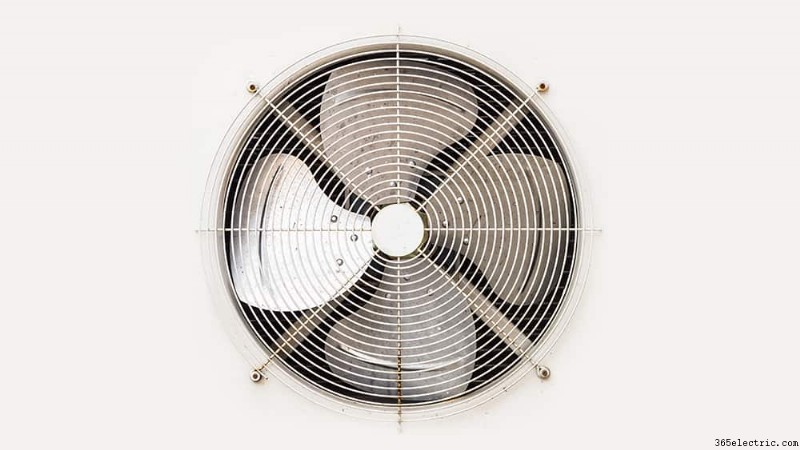
If you cannot figure out why your AC is not working, check the fan. If the AC fan is not turning on, it could be a dormancy issue. Or if your cooling system was lying dormant in winters and you have switched it on after some time, then fans may find it hard to start rotating again because of the dirt buildup.
Call an HVAC expert; they will know how to start the fans manually. The problem shouldn’t persist once the fans are out of dormancy.
6. AC Not Turning On? – Check the Switch
It’s the most obvious reason, but people overlook it all the time.
Just like any other electric appliance, your AC also has an ON/OFF switch. You will find it near to where your system is installed.
You may not have turned it off, but someone in your home could have done it. So, whenever your system refuses to turn on, do check the switch before you do anything else. The solution is simple, turn on the switch, and you would be feeling the pleasant breeze of air blowing in no time!
7. Uncleaned Condenser
Is your external AC unit not turning on?
The external or outside unit of your AC is called a condenser. Its job is to release the heat collected by the inside unit to the external environment.
Without regular maintenance, the condenser can get really dirty over time. It will have to work harder to disperse the heat as dirt acts as an insulator. The condenser will start drawing too much current, tripping the circuit breaker, and your AC won’t turn on.
If you think that the solution would be easy since you can clean the condenser yourself, well, unfortunately, it’s too late for that now. Once it is non-functional due to dirt, it may be time for a professional clean-up. Improper cleaning can damage the compressor coil’s fins, which is way worse than the dirt on the coils.
You can, however, as a maintenance routine, keep cleaning your condenser regularly yourself to prevent any major issues.
8. Tripped Circuit Breaker
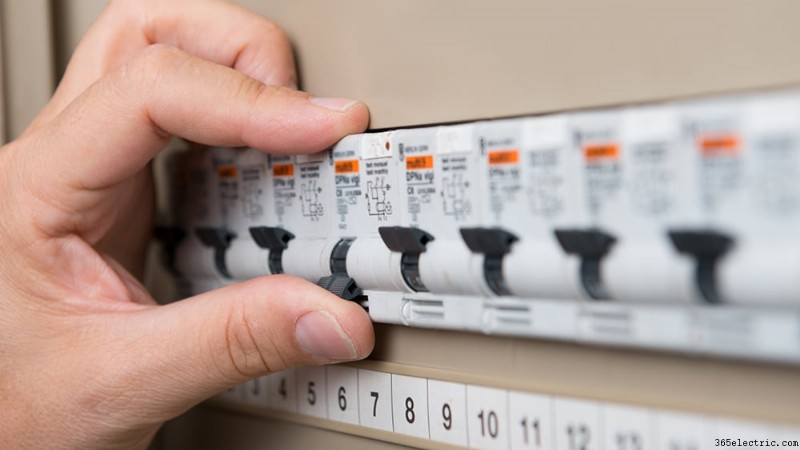
If you have tripped the circuit breaker, your AC won’t turn on.
So, whenever your AC unit is not turning on, do check the circuit breaker.
A circuit breaker is a safety tool that turns the power off in case of heavy voltage. It may be due to using high voltage appliances or power surges in the electricity grid.
All you’ve to do is find the air conditioner circuit breaker and turn it off completely. Then wait for a few minutes before turning it on.
Safety tip: If it keeps tripping, do not try to turn it on as it indicates a high voltage and can cause an electric fire. It is a problem that needs to be fixed by an expert.
9. Is Your AC Not Turning On Or Has It Run Its Course?
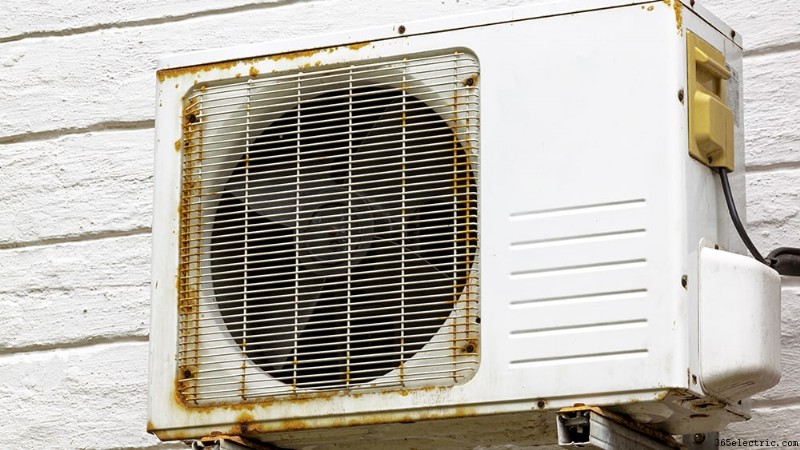
Your AC has stopped running, and you are wondering what could be the reason. If it has been your comfort companion for quite a long time, maybe it has reached the end of its lifespan.
But how can you actually tell that it’s time to say goodbye to your AC?
Following are some signs indication why your AC is not turning on:
- You notice a significant decrease in AC’s airflow. The decreased airflow can be due to dirty filters, but if cleaning the filters does not work, your AC has aged and needs replacing.
- Your AC requires repair services every now and then, which could give a clue if your AC has problems related to its lifespan.
- Your bills are increasing at an abnormal rate. Near the end of life, the AC becomes sluggish and overworks to maintain the desired temperature, leading to a surge in bills. You can go for an energy audit to see if it is really your air conditioner causing the bills to increase.
- The inside unit of your AC is leaking excessively. It may be due to a refrigerant leak, but even if the issue does not get resolved, it’s time for the unit to go.
- If your AC is making weird loud noises such as grinding, screeching, rattling, it’s time to replace it as it signals a serious problem.
- Your air conditioner smells bad. It could be due to molds growing inside your unit or due to dirty filters, but if the smell does not go away, consider replacing it.
If you are experiencing some of the above-mentioned signs and your AC is more than a decade old, you surely need a new unit. But do not take the decision on your own, have a professional thoroughly check your unit before going for a replacement.
Also, read these six ways to extend the average life of your AC.
10. Clogged Drain Pan
Your air conditioner unit not only cools or heats your house but also removes moisture from the air. So, where does that moisture go?
It is collected in the drain pan, located underneath the indoor unit evaporator coils, then flows into the condensate drain line, which is directed outside.
Without regular cleaning, especially in areas with high humidity, the drain pan can become clogged. The drain pan has a secondary drain to prevent the pan from clogging. But if both of them are full, this triggers the float switch, which turns the AC off. It is a safety mechanism that prevents excessive leakage in your house and prevents damages to the unit. But even then, the water leak from the clogged pan can damage your walls, ceilings, and furnishings.
So, your AC is not going to turn on until the pan is cleaned and the float switch is turned down.
You can use a wet/dry vacuum to suction the blockage out, but it is going to be really messy so if you don’t want to see all that gunk, better call an HVAC technician.
Make sure never to have this episode and do regular maintenance. You can use a wet/dry vacuum during the routine cleaning; we hope it won’t be this messy!
11. Damaged Motor
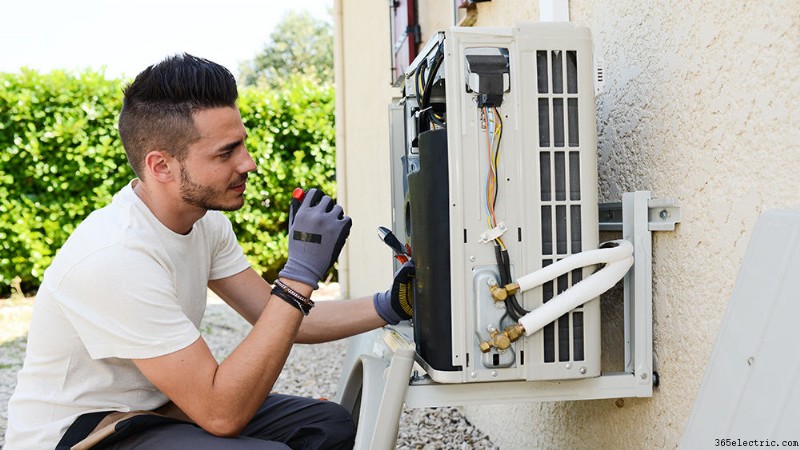
If you hear grinding noise when you turn on the AC, it is not a good sign as it may indicate malfunctioning motor blades.
Motors are sealed to prevent any contact with the outside air, water, or debris. Over time, due to old age or lack of maintenance, the seal can come off, and the oil which was sealed within the motor needed for lubrication seeps out. Without oil, the motor can wear out and can stop working entirely after some time. The outside unit cannot dissipate heat if the motor is faulty.
One question that arises; should you repair the motor or replace your air conditioner?
Here’s a tip that will make it easy to decide; if it costs half the amount of the original price, then consider replacing your system. The price range is $150 to $750 for a new motor.
Contact an HVAC specialist for a thorough inspection.
12. Faulty Power Cord or Outlet
Sometimes the issue is not severe; it’s just that you are anticipating the worst. So, examine simple things that are right in front of you; check the power cord, for instance.
The power cord can become frayed and wear down if your unit was stored for a season. Power outages can also damage the cord.
Unplug the cord for proper examination. If it shows signs of damage, you would have to replace it.
Or maybe it is not the cord, but the outlet was plugged in. You can check if the outlet is working fine by plugging in other appliances. If none of them work, you know what’s causing the issue.
Call an electrician to repair or replace the outlet, depending on the damage.
Safety tip: You should never attempt to repair the cord or power outlet yourself. There is a risk of getting an electric shock if you don’t turn off the power supply. Just turning the switch off won’t do; you have to turn the power off from the main power box.
Related: Home AC Blowing Warm Air? 12 Possible Causes and Their Solutions
13. Your AC Is Not the Right Size
Did you take into account the size of an air conditioner when buying it? Well, it is a mistake that is continuously overlooked but can have a great impact on the performance of the HVAC system.
The air conditioner that is not the right size will have to work harder and, at one point, will break down completely.
When your AC is larger than required, it will keep turning on and off quickly, increasing wear and tear. Further, it won’t remove the excess humidity as it does not stay on for a sufficient time.
On the other hand, a small unit will have to run for a long time to cool/warm the house, which may cause overheating of the capacitor.
An HVAC system that is not the right size can also wreak havoc on your bills.
Unfortunately, the only solution is to replace the unit.
Some parameters determine what size you require, such as the area of your house, climate, number of windows, and insulation level. You will have to go for a professional evaluation to find out the perfect size of air conditioner for your home.
There is also an equation that roughly estimates the right size of AC.
(Square footage of your home x 25/ 12000) – 0.5 =Required AC size
Let’s say your area is 1000 square feet.
(1000×25/12000) – 0.5=1.5
You require a 1.5-ton AC.
If you figured out why your AC was not turning on and managed to find the solution on your own, congratulations! But even then, we recommend that you contact a professional for a complete inspection to avoid similar problems in the future.
By having an HVAC expert perform annual inspections and staying on top of the maintenance routine, you can avoid any potential AC outages in the future.
- Hrup klimatske naprave:kaj jih povzroča in kako popraviti klimatsko napravo, ki povzroča hrup
- Težave s pretokom zraka HVAC:12 pogostih vzrokov in kako jih odpraviti
- Odpravljanje težav s klimatsko napravo:11 razlogov, zakaj klimatska naprava ne deluje in kako jih odpraviti
- Klimatika povzroča hrup:5 zvokov klimatske naprave + kako jih odpraviti
